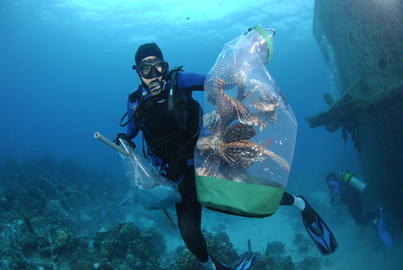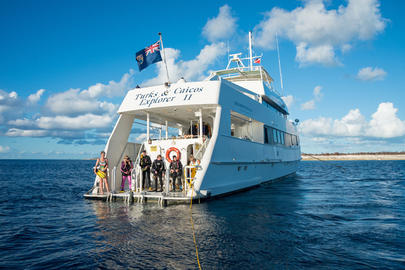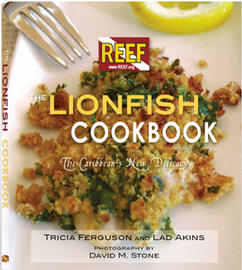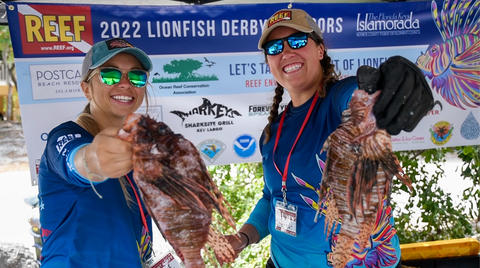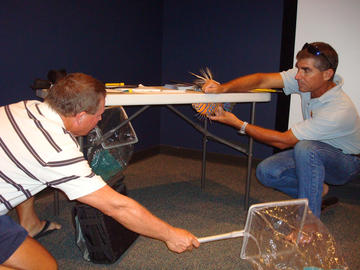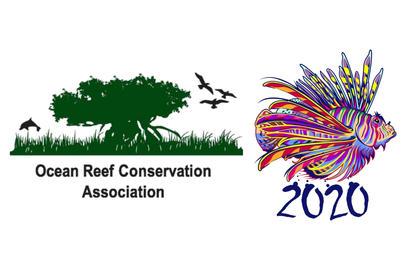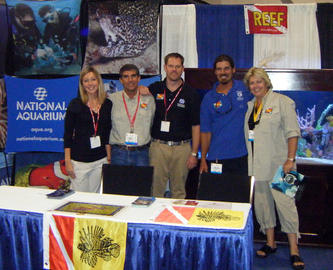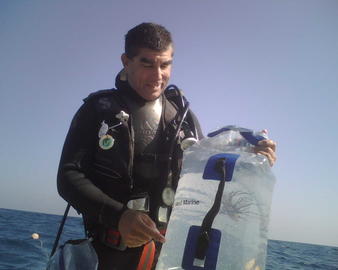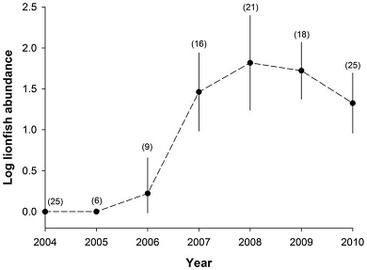We are now accepting registrations for our Invasive Lionfish Trip aboard the Belize Aggressor III on June 8-15, 2019. This trip will be led by Invasive Species Program Coordinator, Alli Candelmo, Ph.D., and Education Program Manager, Ellie Splain. This Invasive Lionfish Trip is part of REEF’s ongoing effort to monitor the establishment and consequences of invasive lionfish on native fish populations and reef ecosystems.
Although we are just one month into the year, our 2019 Field Survey Trips are filling up fast! Because of the great response, we have decided to add two new trips to the 2019 schedule: an invasive lionfish-focused liveaboard trip to Belize this June, and a fish survey liveaboard trip in December, to the Turks and Caicos Islands.
REEF announces the release of "The Lionfish Cookbook", available for $16.95 online at http://www.reef.org/catalog/cookbook. The book is a unique blend of 45 tantalizing recipes, background on the lionfish invasion and its impacts, as well as information on how to safely catch handle and prepare the fish. Invasive lionfish are a new threat to western Atlantic, Caribbean and Gulf of Mexico waters.
Be sure to join us for the Florida Keys Lionfish Derby & Festival on Sept. 8-11, 2022! The event includes two days to collect as many invasive lionfish as possible, followed by a family-friendly lionfish festival hosted at the picturesque Postcard Inn Beach Resort & Marina in Islamorada. The festival is open to the public and features lionfish tastings, drink specials, educational demonstrations, games, interactive booths from environmental vendors, live music, and more.
The impacts of invasive lionfish (Pterois volitans/miles) on native coral reef populations in the Western Atlantic Ocean and Caribbean Sea can be enormous.
REEF is working in close partnership with the Florida Keys National Marine Sanctuary (FKNMS) to diligently track lionfish reports and initiate removal efforts in South Florida. The first confirmed lionfish in the Florida Keys was reported and captured within 24 hours in January 2009 (see previous enews article). Subsequent early reports in March-June were met with successful rapid response.
REEF’s 2020 Upper Keys Lionfish Derby is sponsored by Ocean Reef Conservation Association (ORCA), a non-profit dedicated to protecting and preserving the environment, fish, wildlife, and marine related areas including water quality and habitat. Since 2009, ORCA has supported the efforts of several non-profits including Bonefish and Tarpon Trust, The Everglades Foundation, Audubon of Florida, Coral Restoration Foundation, Coastal Conservation Association and more. Education is an important part of ORCA's mission.
Earlier this month, the Dive Equipment and Marketing Association (DEMA) held its once a year industry-wide, international trade show in Las Vegas. As part of the show, which attracts over 10,000 industry professionals and businesses, DEMA recognized the importance of the recent lionfish invasion into the Atlantic and asked REEF to present four show-sponsored talks for attendees and members.
While we all knew it was just a matter of time, the call still came with a bit of surprise and dread as the first confirmed lionfish sighting in the Florida Keys came in on January 6th, 2009. REEF member Becky Fowler, from Greenville, SC, was diving just offshore of the Benwood Wreck in Key Largo when she spotted the invasive lionfish near the base of a ledge at 66'. With all of the recent focus and outreach efforts that REEF has been forwarding to our members, she knew immediately that she needed to document the sighting and gather a detailed description of its location.
There is growing concern that lionfish will affect the structure and function of invaded marine ecosystems. REEF Director of Special Projects, Lad Akins, is a co-author on a recently published paper evaluating these effects. The study was published in the scientific journal, PLoS ONE. Lead author, Stephanie Green, from Simon Fraser University (SFU), along with Akins and other co-authors Aleks Maljković (SFU), and Isabelle Côté (SFU), documented a dramatic 65% decline in 42 species of reef fish eaten by lionfish over a two year period.

